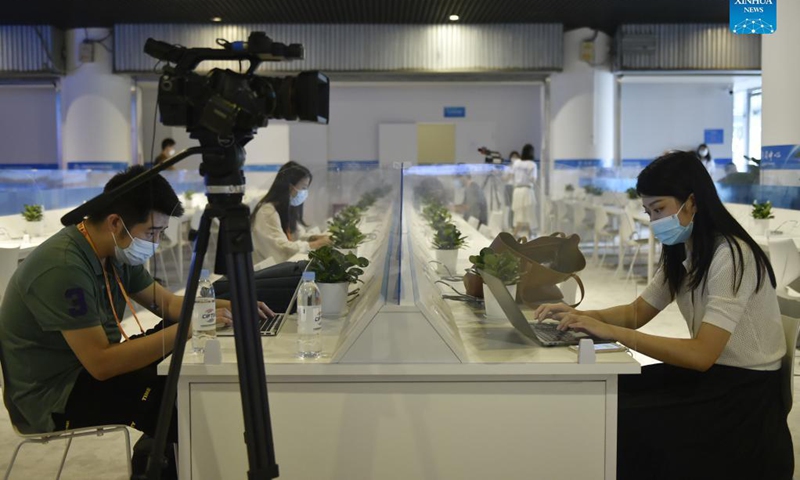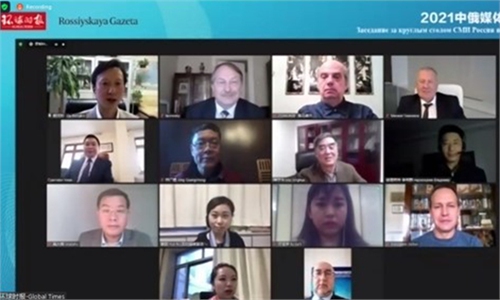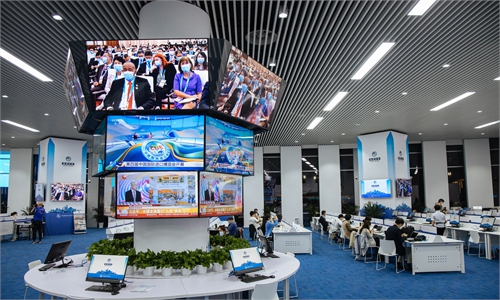Frontline media need to be trusted to carry on mission

Journalists work at the media center of the China International Fair for Trade in Services (CIFTIS) at the China National Convention Center in Beijing, capital of China, Sept. 1, 2021. Photo: Xinhua
November 8 is the Chinese Journalists' Day. I have been doing journalism all my life, and I am proud of my profession. It has offered me insights and enabled me to experience all kinds of people and things in this world. What I personally do and what I think are closely connected with the mainstream concerns of society. Most of the time, I feel I live a fulfilling life and have a strong sense of integration into this era. I believe these are important sources of my personal happiness.However, I also underwent changes in the media industry. As such, I feel deeply that it is becoming more and more difficult to do media. Society has high requirements and hopes for the media sector. But many people do not understand the fundamental nature of the media, and its political role in promoting social progress.
Why I say that? Everyone knows that the media, from newspapers, radio, television to the internet, were all invented by the West. Therefore, the media industry was built on Western institutional factors and values. In China, we must make good use of the nature of media on the one hand, but on the other, we must "Sinicize" them to make them fit China's political system and value system. This means that Chinese media professionals must be a group of explorers who are responsible for one of the most difficult parts of China's exploration.
Some people say, why don't you just follow the New York Times, CNN, and BBC? But it's too naive to say that. The media, political and value systems of a country are destined to be a tailor-made relationship. The basic reality of China is different from that of the US and Europe. How can our media follow their paths? If all Chinese media did like the practices of Western media, China would have definitely not been what it is today.
Exploration is bound to be the collective responsibility of Chinese media people. It is the unique mission of Chinese media people to make the industry correctly lead public opinion and play an active and appropriate role in the great rejuvenation of the nation. There is no experience that we can imitate. Since the country's reform and opening-up was launched, media professionals have been keeping pace with the country's great exploration. They have often stood at the forefront of the times.
Obviously, the media people and the publicity departments that guide them should be the main body to realize this kind of exploration. As a battlefront, they should be trusted and have the independent space to carry out innovation that fits the needs of the times. This is crucial to fully mobilize those of us in the media and form our strong ability to serve the national interests and protect the fundamental interests of the people.
However, frankly speaking, media practitioners have been subject to increasing restrictions for some time. Most of these interventions have come from government departments and local governments other than the publicity department, as well as various influential institutions. For their own considerations, they require the media to closely cooperate with their work and constantly ask what the media should and should not report. This is especially so when they encounter negative public opinion and hope the media can keep silent and help cool the situation.
Not all of these requirements are unreasonable. The media's coordination with local governance is not a problem in terms of principles and value orientation. However, I feel that such specific requirements are on the rise. This has formed an increasing force of intervention in the work of the media. It has squeezed the room of the media to self-explore ways that support the country's policies. I personally think this trend is very debatable. The publicity front should be accountable to the Central Committee of the Communist Party of China and to the overall interests of the country. Although national interests are often reflected to a considerable extent through the work of specific departments and localities, they are not the same after all.
If the media indulges in serving localities and departments, it will impact the media's function as news outlets and lose credibility and combat effectiveness. Its actual result is the loss of the country's systemic functions. The more interference they receive, the greater pressure of "making mistakes," and less enthusiasm journalists will have. Some people, affected by the mentality of "no accident" in some departments and places, will become more conservative and only seek their own safety.
In fact, as long as the political direction is firm, there is little chance that the media will make serious mistakes. Errors are mainly technical, causing bad perception and impact, but generally do not produce serious actual consequences. The value orientation of individual media outlets may go wrong, but that is another matter. In most cases, a government department or local government made an improper statement or an improper decision, prompting the media to "mistakenly" report it, which later becomes so-called hyping. I think it is the source of the error, not the media, which should be held responsible in cases like this.
Our society needs to respect the media and media professionals more, but in reality such respect is obviously not enough. Not long ago, I saw a report that a government department scheduled a meeting with the media. However, meeting with the media should be done by the publicity department. This is not the power of a certain government department. The reason behind it may be that some departments are not sufficiently aware of the need to respect the media.
As a veteran journalist and editor, I sincerely hope that our group can fulfill its mission and continue to make a difference in exploring the path of media with Chinese characteristics. This is a difficult and super important job. Our society is a community under the leadership of the Party. The media is not a private entity. Our division of labor is different, but what we safeguard is the public opinion battlefield. I hope that the entire society, including the government, will continue to give us support, tolerance and encouragement.
The author is editor-in-chief of the Global Times. opinion@globaltimes.com.cn



